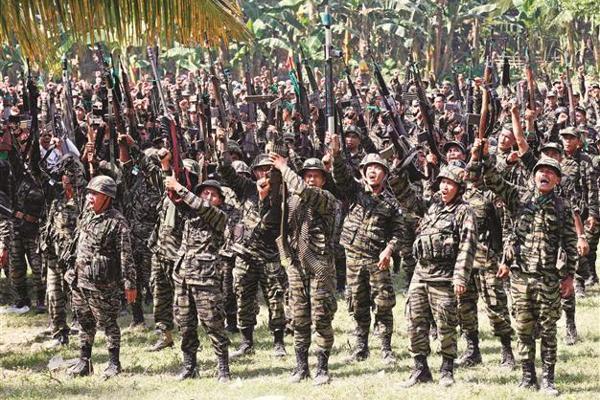Philippines, Muslim rebels sign landmark peace deal
MANILA


Moro Islamic Liberation Front rebels raise their firearms in celebration of the peace deal in Maguindanao province. The deal will serve as a roadmap to forming a new autonomous region in the south. REUTERS photo
The largest Muslim rebel group in the Philippines signed a landmark peace plan with the government yesterday aimed at ending a decades-long insurgency in which 150,000 people have died.President Benigno Aquino and Moro Islamic Liberation Front (MILF) chief Murad Ebrahim held a historic meeting ahead of the signing of the accord, which outlines steps towards a final resolution to the conflict by 2016.
“This is the sound of peace,” Ebrahim said as he banged on a miniature version of a traditional Philippine Muslim gong that he gave to Aquino during their meeting at the presidential palace. “We extend the hand of friendship and partnership to the president and Filipino people,” Ebrahim said.
President Aquino, who has driven the process since assuming office in 2010, also hailed the agreement as a chance to “finally achieve genuine, lasting peace.” Ebrahim became the first MILF chief to visit the presidential palace, signifying the optimism from both sides about finally ending more than 40 years of conflict and the priority Aquino has put on achieving peace.
Path towards peace still littered
Under the plan, the 12,000-strong MILF will give up its quest for an independent homeland in the southern Philippine region of Mindanao in return for significant power in a new autonomous region there. However the MILF’s leadership, the government and independent observers have warned the path towards peace remains littered with obstacles, and that the signing does not guarantee an end to the conflict.
Aquino is expected to issue an executive order shortly to form a 15-member transition commission that will formulate new legislation by 2015 to create a new Muslim local government for the “Bangsamoro,” the name given by the Moro tribes for their homeland.
A plebiscite later in Muslim-dominated areas in the south will determine the shape and size of the new Bangsamoro area.
The new autonomous government will have greater political powers and more control over resources, including minerals, oil and natural gas than the existing Muslim-governed entity. Currency, postal services, defense and foreign policy will remain under the central government in Manila. The agreement did not give details of the power-sharing arrangement between the national government and the Bangsamoro. But it guarantees rights of both Muslims and non-Muslims, unlike a 2008 deal that was struck down by the Supreme Court as unconstitutional.
A ceasefire between the MILF and the government in place since 2003 has largely kept the peace, but outbreaks of deadly violence have occurred over the past decade.
The MILF is the biggest and most important remaining rebel group, after the Moro National Liberation Front (MNLF) signed a peace pact with the government in 1996.
